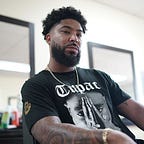Media Literacy: I’m Still Stuck on Selfies
“They could care less about the Z pattern in paper ads. Now they all wanted to know if their teacher had a Facebook. Maybe, I thought, I should have just brought newspapers.”
I had no clue how to teach Media Literacy to middle schoolers so I started with something I knew. I shoved a stack of magazines into a No Frills bag before going to sleep. When first period started I dumped the contents of the yellow bag on to my desk. “This is some of the media I am interested in, some of the magazines I’ve actually read. Y’all know newspapers, right?” I paused for a second to gauge if my hook had sunk, “notice how there are no newspapers in this pile.” I said with a smirk and a laugh. “Yeah, I don’t read them either.” I think maybe one kid might have laughed with me.
“I want to start this Media Literacy unit by exploring things that we know. And, I want it to be relevant to you guys,” I continued. I felt confident that my bases were covered: Sports Illustrated for my boys, GQ and Hello Canada for my students who kept things ambiguous, Teen, Home Decor and Elle for the ones more into feminine perspectives. I even picked up some leftover Owl and Chirp magazines that were sitting in the library to keep it academic. Differentiated content at its finest. I told them to pick up magazines that appealed to them and then examine the advertisements. My students got straight to work, ripping apart magazines, sharing pieces with other students, exploring — laughing — really exploring the material.
And then my first lesson on Media Literacy went to shit.
One of them asked me if I had Facebook. I didn’t know how to respond. Around 2010, Teachers College merely taught me how to be a “teacher,” and nowhere along my learning journey did I pick up on how to also be a real human being in the classroom with younger humans. And of course I had Facebook. I had Facebook before they even learned how to add two digit numbers. I wanted to say that, but I didn’t. Instead I picked up the nearest magazine, flipped to the first advertisement I could pluck and asked them if they noticed the Z shape pattern that the ad used in order to draw attention. I think maybe one kid might have squinted at what I was holding. I just continued on, telling them what I was taught about media, and about being literate about media. I taught them what I learned ten years ago when a teacher told me about the big, bad media.
They could care less about the Z pattern in paper ads. Now they all wanted to know if their teacher had a Facebook. Maybe, I thought, I should have just brought newspapers.
I stood firm (whatever that means) and ploughed towards the lesson’s end without taking any direct inquisitions about my media habits. Weeks later I tested them on the things I taught them about media. Persuasive techniques and propaganda and even politics inside of programming. And the pupils who passed everything else passed these tests too.
I failed to revamp my Media Literacy unit the following years. But in those years students stopped asking me about Facebook. I was finally ready for them to ask, but they didn’t. They had moved on while I was still thinking about clever ways to update my status. By the time I finally brought Facebook into my classroom as a form of negotiation, learning, and understanding “media literacy,” they looked at me like I brought in magazines.
When I taught them about how they should lock their social media accounts, they showed me tools in the settings tab to better lock my own accounts. “Handles…Mr. Morris, not accounts. Your handles.” When I came around to teaching them about likes on Instagram and how social media can be tied to our mental well-being they told me about algorithms. I learned that word in a twelfth grade functions class. Back then, algorithms had nothing to do with advertisements or media or what they now called, “socials”.
They’ve tried to get me to dance with only my hands, showed me how to take pictures while still on a locked screen, save videos on platforms I thought were only for taking pictures in the moment, use prior content and layer it with music, then different music, and then different pictures. I’m still stuck on selfies.
So now, when I teach Media Literacy, I don’t come in with something that I want to teach them. I learned that I got some learning to do. That, my footprint, our footprint as educators — when it comes to this media literacy thing — has always been a step behind with this generation. So, now, I let them start. I’ve learned that. Sorta kinda, idk.
